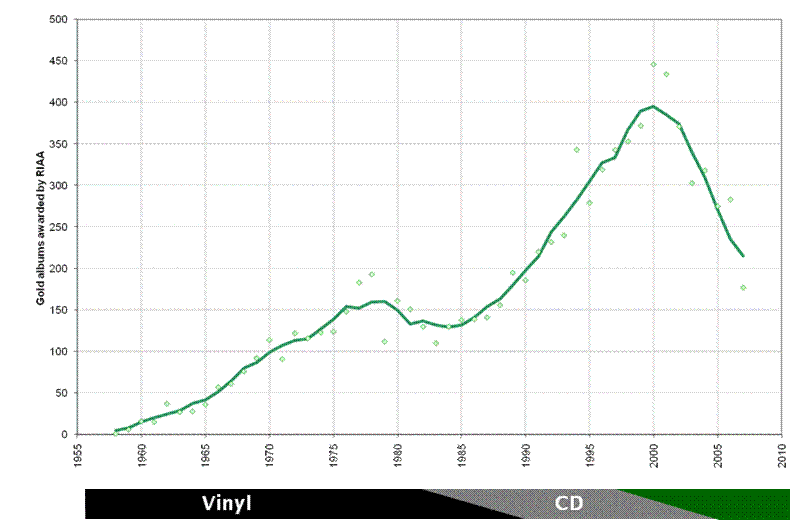|
The decline of the album in general has to do just as much with the nature of music itself as it does the format. Albums are merely collections of songs, and songs are usually designed to where they can be listened to individually just as easily as they can as a group. Albums sales weren't all that big prior to the 60s, but started to grow rapidly throughout the remainder of the 20th century. While hard numbers for total album sales all the way back then are hard to come by, there's not many albums from the 50s that sold over a million copies. Harry Belafonte's Calypso, released in 1956, was the first album know to have sold a million copies. Back then, singles were main seller. Everybody just wanted to listen to just the hits. However, The Beatles and Led Zeppelin were the starting point of the album rather than the single becoming the "primary" unit of music — that is, people treating an album as a whole work rather than a collection of smaller, more "self-contained" works — and the oldest albums to have sold over ten million copies in the U.S. were from those two bands. Album sales trended upwards through the 70s and onward, and by the 90s having a platinum album was a trivial task even for only moderately popular bands. Album sales peaked around the turn of the century before declining with the advent of the mp3 player. Here's a graph claiming to show the number of gold albums from 1955 to 2005:

The mp3 player made the return of the single a trivial task. Individual songs could be delivered much easier than they could via a CD single, the latter of which could retail for $4-5. Interestingly, the arrival of the mp3 player coincides with popular music starting to change (I'd say "regress") back to disposable, flavor-of-the-month pop-rap music. Look at what acts produced some of the most popular albums in the 70s, 80s, & early 90s: The Beatles, Zep, the Eagles, Fleetwood Mac, Billy Joel, Boston, Pink Floyd, AC/DC, Michael Jackson, Guns & Roses, REM, Def Leppard, Tears for Fears, Phil Collins, U2, Nirvana, and Pearl Jam, among others. Sure, even the 70s & 80s had their fair share of disposable crappy bubblegum pop like disco, Debbie Gibson, and NKOTB, but they never lasted and aren't usually remembered fondly.
But today that's all we have: 21st century counterparts to Debbie Gibson and the freakin' New Kids on the Block. When you have so-called "talent" like Kesha, Flo Rida, LMFAO, Kanye West, the Black-Eyed Sellouts (my nickname for BEP; they used to be a decent hip-hop group pre-Fergie), and that trashy guttersnipe Miley Cyrus among the most popular acts of the past few years, you know there's something wrong. It's the disco of the 21st century. Adele is probably one of the few exceptions, as she's fairly talented (though I'm not a fan of her musical style, she does have a good voice) and has a more adult contemporary sound that's a lot different from most popular music, and wouldn't you know, her album 21 was the first in over a decade to sell over 10 million copies in the U.S. Considering that the majority of music is bought by older audiences (30+) these days, maybe all this cheap crap geared to teens and 20-somethings, couples with tech that helps the younger crowd get their fix for just those few big Top 40 hits, is a big reason for not just the decline of the album, but the decline of the U.S. music industry as a whole. The pendulum swung from single-driven trendy pop, to album-driven music (mostly rock) that was more "serious" and with long-lasting intergenerational appeal, and now back to single-driven trendy pop.
Well, that was a pretty big tangent there, but I hope it served to illustrate just why music sales are what they are, and that despite their decline CDs are far from dead. Buying full albums is usually cheaper for physical than for digital, the sound quality is usually better, and there are other benefits associated with a tangible copy. There is still plenty of demand for music on physical formats, though said demand is only half of what it was 30-40 years ago. MP3 players are fine if you listen to lots of music on the go, but they are by no means the clear superior to physical formats.
|





















